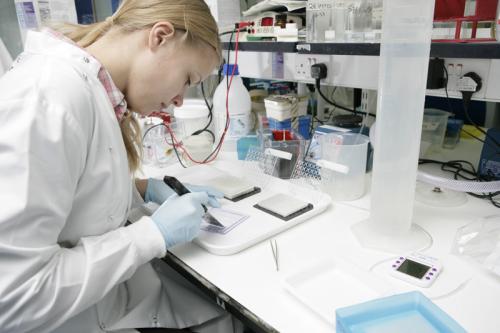
Agne Kazlauskaite selected to attend Roche Continents 2014
Agne Kazlauskaite, a PhD student in the MRC Protein Phosphorylation and Ubiquitylation Unit, has been selected to attend the prestigious Roche Continents programme that will take place in Salzburg, Austria this summer.
The Roche programme brings together 100 of the most creative students in science, music and art from all over Europe to participate in a series of seminars, workshops, and concerts taking place in in Salzburg, during the world-famous Salzburg music festival.
Agne, who is currently in the 3rd year of her PhD, has been working between the labs of Dario Alessi and Miratul Muqit and has made groundbreaking progress in the understanding of two enzymes, PINK1 and Parkin, that are mutated in familial Parkinson's disease. Most recently Agne discovered that PINK1 can directly phosphorylate ubiquitin at Serine65 and that this modified form of ubiquitin can activate Parkin ubiquitin ligase activity. Her work has shed considerable molecular insight into this progressive disorder and stimulated new ideas on how it could be treated with drugs.
On hearing of her success at obtaining a place at Roche Continents, Agne said 'I'm thrilled to have the opportunity to attend such an exciting conference and to expand my horizons by meeting people from such a wide range of backgrounds. I hope it will inspire me with new ideas for my future work!'
The Roche programme brings together 100 of the most creative students in science, music and art from all over Europe to participate in a series of seminars, workshops, and concerts taking place in in Salzburg, during the world-famous Salzburg music festival.
Agne, who is currently in the 3rd year of her PhD, has been working between the labs of Dario Alessi and Miratul Muqit and has made groundbreaking progress in the understanding of two enzymes, PINK1 and Parkin, that are mutated in familial Parkinson's disease. Most recently Agne discovered that PINK1 can directly phosphorylate ubiquitin at Serine65 and that this modified form of ubiquitin can activate Parkin ubiquitin ligase activity. Her work has shed considerable molecular insight into this progressive disorder and stimulated new ideas on how it could be treated with drugs.
On hearing of her success at obtaining a place at Roche Continents, Agne said 'I'm thrilled to have the opportunity to attend such an exciting conference and to expand my horizons by meeting people from such a wide range of backgrounds. I hope it will inspire me with new ideas for my future work!'

